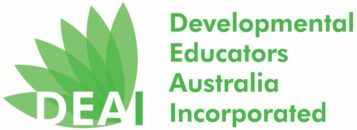This page is designed to answer frequently asked questions about DEAI membership.
To be read in conjunction with the Membership Eligibility page.
I have lots of experience working with people with disability, will this qualify me for membership?
We recognise that people are passionate about working with people with disability and acknowledge the important work people do in the field. However, work experience is only considered in conjunction with relevant formal education.
I have a special education degree (bachelor’s or master’s), does this qualify for Full Membership?
Special Education involves curriculum and strategy design, teaching, and instruction, and other supports of children and young people with disability and other ‘special needs’ across a range of settings. Developmental educators work with people with disability across the lifespan (including acquired and degenerative conditions) in multiple domains and settings and whilst there is a focus on instructional and behavioural technologies, developmental educators have formal education in meeting the needs of people with disability related to health and mental health conditions, employment, housing and accommodation, sexuality and relationships and ageing. Developmental educators have formal skills in case management and support coordination, counselling and advocacy. In Australia, developmental educators are guided by a human rights-based and holistic biopsychosocial approach to practice. Developmental educators have knowledge of and utilise the Convention on the Rights of Persons with Disabilities (CRPD, 2007), and the International Classification of Functioning, Disability and Health (WHO, 2001).
A degree in Special Education does not meet the core competencies for developmental educators.
I have a teaching or education degree (bachelor’s or master’s), does this qualify for membership?
Developmental educators work with people with disability across the lifespan (including acquired and degenerative conditions) in multiple domains and settings and whilst there is a focus on instructional and behavioural technologies, developmental educators have formal education in meeting the needs of people with disability related to health and mental health conditions, employment, housing and accommodation, sexuality and relationships and ageing. Developmental educators have formal skills in case management and support coordination, counselling and advocacy. In Australia, developmental educators are guided by a human rights-based and holistic biopsychosocial approach to practice. Developmental educators have knowledge of and utilise the Convention on the Rights of Persons with Disabilities (CRPD, 2007), and the International Classification of Functioning, Disability and Health (WHO, 2001).
A degree in teaching or education does not meet the core competencies for developmental educators.
I have a degree in behavioural science or psychology (bachelor’s or master’s), does this qualify for membership?
Developmental Education differentiates itself from other disciplines by employing a critical approach to knowledge acquisition and production in the field of disability. Developmental educators are philosophically based within the discipline of disability studies. Formal education in disability studies centres on the rights of people with disability, utilizing the human rights and social models of disability and critical perspectives on intersectional disadvantage. Disability studies is an interdisciplinary approach to understanding the lived experiences of people with disability, drawing on historical perspectives regarding systems and structures of oppression, and the responding rights and liberation movements. Disability studies employs people with disability and invokes lived experience in educating practitioners. The philosophical frameworks employed by developmental educators prioritise the rights of people with disability in professional practice. Tertiary programs in behavioural science and psychology are not generally underpinned by critical disability theory.
A degree in behavioural science or psychology does not meet the core competencies for developmental educators.
How do I know which topics, or how many topics, to study in courses eligible for individual accreditation?
Universities are responsible for applying to accredit their degree programs with DEAI. There are some degree programs that are not yet accredited which meet the core competencies of developmental education and graduates have been determined eligible to apply for individual accreditation. It is important to liaise with the program director or course coordinator of your intended degree to align your studies to the core competencies of developmental educators. You can refer to this document: Developmental Educator Core Competencies
See also Individual Accreditation
What do you mean by 3 years of relevant and current practice in order to gain individual accreditation?
If your tertiary program does not include an assessed component of work integrated practice (professional placement, in service learning, practical assessments), you will need to demonstrate 3 years of employment or a mix of employment and volunteering in a position working directly with people with disability preferably across a range of ages and in a range of settings.
I already have a degree why do I have to study another degree to register as a developmental educator?
As is the case with all regulated and self-regulated allied health professions e.g. speech pathology, occupational therapy, social work, the professional body sets the standards for accreditation and determines the qualifications that meet those standards. There are currently two fully accredited degree programs delivered by Flinders University and eight master’s degree programs delivered by various institutions that lead to the individual accreditation pathway.
